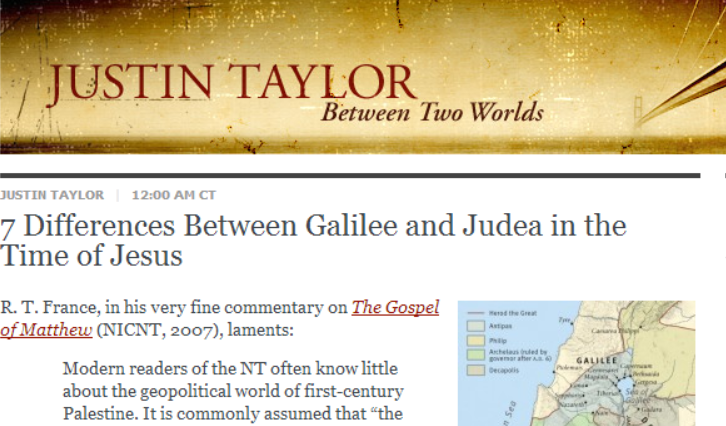Over a year ago Justin Taylor of the Gospel Coalition (not the Justin Taylor, SM of Hebrew University) posted a blog summarizing seven differences between Judea and the Galilee during the Time of Jesus. The summary was from R. T. France’s The Gospel of Matthew.[1] While I agree with France’s so-called lament that NT scholars know little about the world of “first-century Palestine,” we should be careful not to carry on long-standing myths about the world of 1st century Judaism that do not bear out in archaeological or historical sources.
While there were differences between Galilee and Judea these differences seem limited to geographical realities and particular interpretations regarding the commandments. We should not presume, however, that the ancient Jewish communities’ lack of monolithic (or unilateral) unity is equal to a stark separation in thought, language, and even race.[2] Unfortunately, if Taylor’s summary of France is correct, his list of differences between Galileans and Judeans does not take into account the full weight of archaeological and historical evidence. Much of this regarding the Galileans is the mistaken notion that in the days of Simon to Judah Aristobulus, the Maccabean kings repopulated the Lower Galilee on the western side of the lake with Itureans who were forcefully converted to Judaism. In that sense, the Jews of Galilee were distinctly different than their Judean counterparts. The Galileans Jews were thus uneducated, agrarian groups of commoners who were looked down upon by the educated and wealthy southerners. Thus, Jesus’ Galilee, and Jesus himself, was part of society that descended from forced converts who spoke differently and were lax concerning the observance of the law. At a minimum it separates Jesus (philosophically, religiously, and culturally) from the religious and cultural center of Jewish life in the 1st century. That minimum is too heavy a price to pay!
Paid Content
Premium Members and Friends of JP must be logged in to access this content: Login
If you do not have a paid subscription, please consider registering as a Premium Member starting at $10/month (paid monthly) or only $5/month (paid annually): Register
One Time Purchase Rather Than Membership
Rather than purchasing a membership subscription, you may purchase access to this single page for $1.99 USD. To purchase access we strongly encourage users to first register for a free account with JP (Register), which will make the process of accessing your purchase much simpler. Once you have registered you may login and purchase access to this page at this link:
We should attribute any differences between Galileans and Judeans, especially what we have recorded in historical documents, primarily to issues of opposing halakhic opinions. Various halakhic opinions should not be understood, however, as a point of stark division in Judaism but rather a point of intra-Jewish discourse. The disagreements that Jesus often finds himself in are generally matters of Torah observance. To suggest that the aforementioned seven points stand is to misread the evidence that we know with the unnecessary consequence of tearing Jesus from his proper place in Jewish culture.




























































